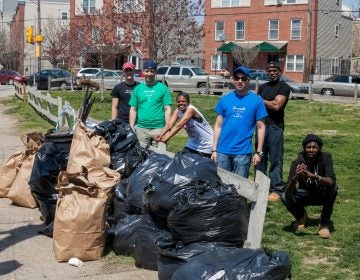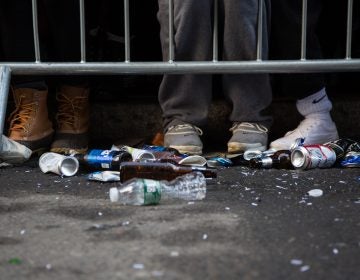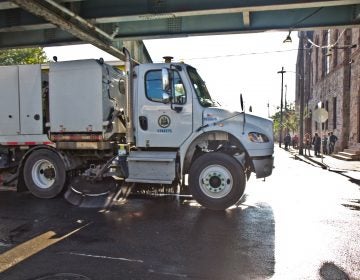Feces and needles ‘jumping in the air’: City street cleaners want better safety gear
Philadelphia street cleaners say the city’s street sweeping pilot is exposing them to health hazards.
Listen 2:50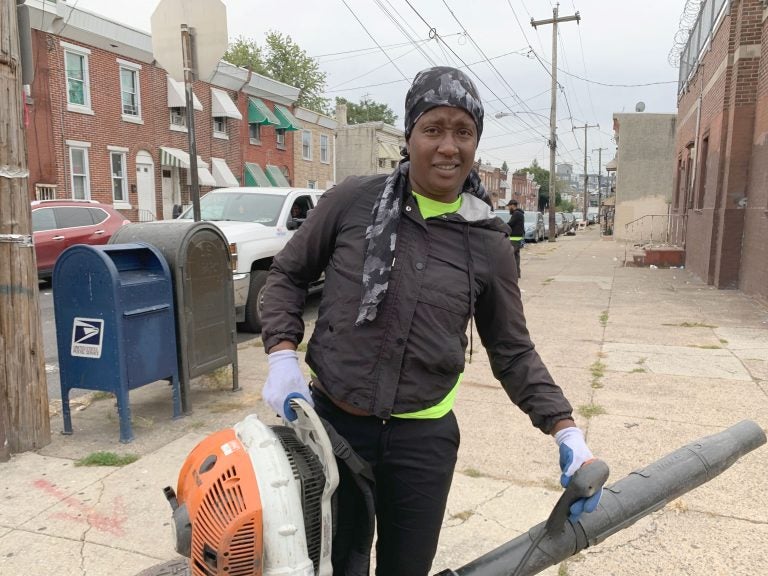
Streets Department employee Shaketa Armstead worries about her health every day she's on the job, in part because the low-quality safety equipment the city provides. (Aaron Moselle/WHYY)
Shaketa Armstead has a dirty job.
Five days a week, she wields a gasoline-powered leaf blower to push trash from curb lines and sidewalks into the street so one of the city’s mechanical broom trucks can suck it all up.
The physical work kicks up a cocktail of dust and debris. The two-stroke engine strapped to Armstead’s back spews partially burned fuel inches from her face.
“It’s always a conscious decision to work out here,” said Armstead during a shift last week.
In Kensington, one of six neighborhoods part of this experimental street sweeping program, workers also contend with syringes and human feces. The health hazards are markers of the city’s opioid epidemic that have become even more problematic in the face of a Hepatitis A outbreak.
“We don’t know what’s on the needles. You know, we got feces we’re blowing,” said Armstead.
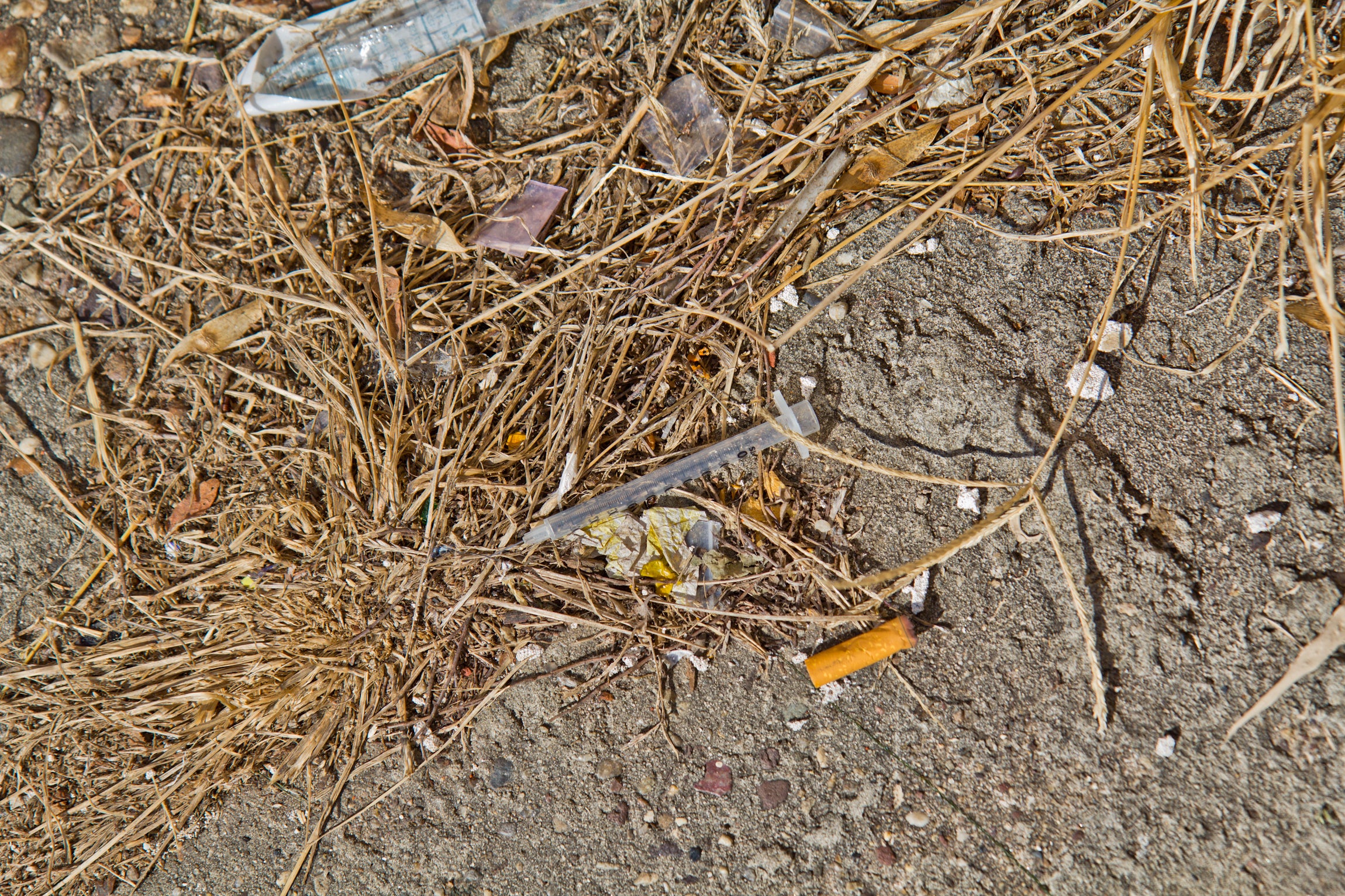
Hepatitis A — a curable but highly contagious and debilitating liver disease — is primarily caused by a virus transmitted by the so-called fecal-oral route.
By mid-October, the number of reported cases in Philadelphia had surged to 360, according to city health officials. A typical year brings two to six cases.
Jose Santana, Armstead’s co-worker, worries about contracting Hepatitis A, but he spends more time thinking about the diseases he could get if a used hypodermic needle pricks him. The list includes HIV and Hepatitis C, another liver disease transmitted through contact with contaminated blood.
“Main thing I worry about is the needles jumping up in the air with the blowers,” said Santana.
And yet, on a recent overcast Wednesday, Santana, and Armstead weren’t wearing face masks, protective glasses or heavy-duty gloves designed to protect against the business end of a needle.
Philadelphia’s Streets Department doesn’t specifically require workers to wear face masks or safety glasses. City policy only mandates that they wear “protective gear,” which includes reflective vests, steel-toed metal boots and gloves.
The department offers workers safety glasses and disposable paper face masks, but there is no penalty for not using them.
What’s more, Santana, Armstead and others say the gear the city provides is low-quality and largely ineffective.
They say the gasoline, dust and dirt they blow around for hours each day easily sneak past the edges of their eyewear and paper masks, into eyeballs and up nostrils.
“Any element that our guys are being exposed to, they’re being exposed to,” said Omar Salaam, a business agent with AFSCME District Council 33, the labor union group that represents more than 1,100 Streets workers.
Worker safety on a budget
Salaam is a former trash truck worker. He said he’s constantly pushing the department to do better by his members, but the city always comes back with concerns about affordability.
As a result, workers who want better safety gear must go into their own pockets, he said.
“The city always finds a way to find money for all the things they want to do, but something as basic as making sure the guys have the proper equipment to do their job, it’s always a fight,” Salaam said.
Salaam’s latest battle was over puncture-proof gloves. He and the workers he represents won.
Streets spokeswoman Keisha McCarty-Skelton said the department issued the new gloves weeks ago.
Worker safety is the Street Department’s “number one priority,” said Philadelphia Streets Commissioner Carlton Williams.
“If we need to get them a different type of equipment for them to be safe while they’re doing their jobs, then that’s what we’re going to do,” Williams said.
Yet the Streets Department’s $227 million annual budget doesn’t include money for upgrading the safety goggles and face masks it distributes to workers, said Williams.
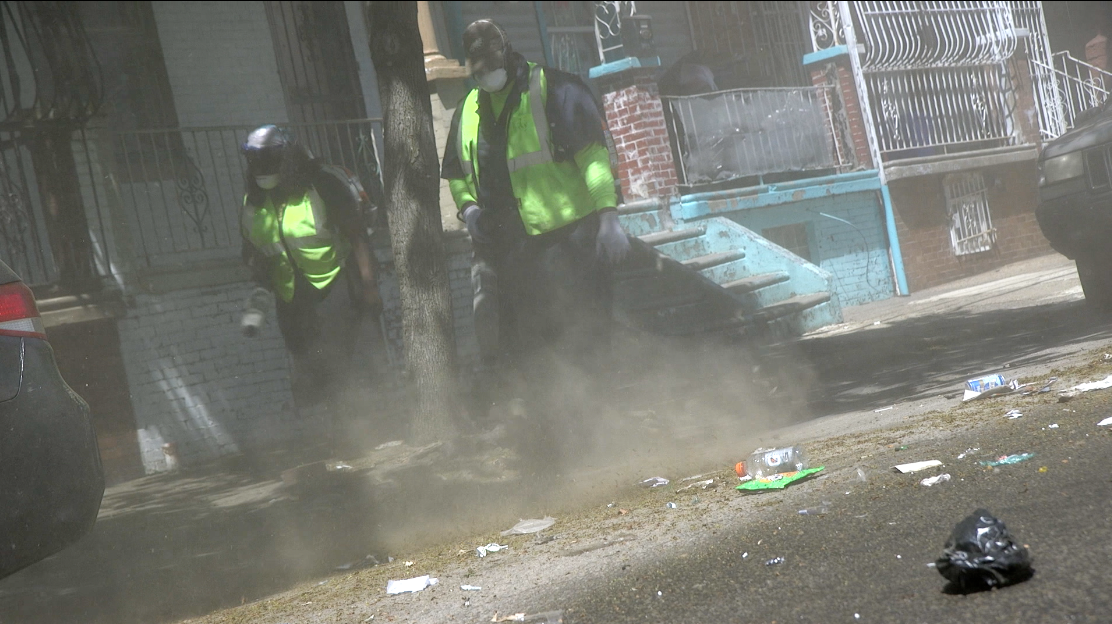
The city also acknowledges that the gloves came only after Salaam’s union voiced concerns about people getting pricked with needles.
Salaam said it took the city six months to order the gloves and still, not all workers have received them.
Armstead and Santana were still wearing the standard contractor gloves last week. Armstead has since received new gloves, according to McCarty-Skelton.
City Hall spends approximately $442,000 a year on safety supplies and gear. She could not provide a breakdown of how much the Streets department spends on gloves, eyewear and face masks.
Williams said the request for new equipment – if deemed necessary and affordable – would most likely be folded into the department’s next budget ask in the spring.
It’s possible the safety upgrade could come sooner if the department deemed it more urgent, he added.
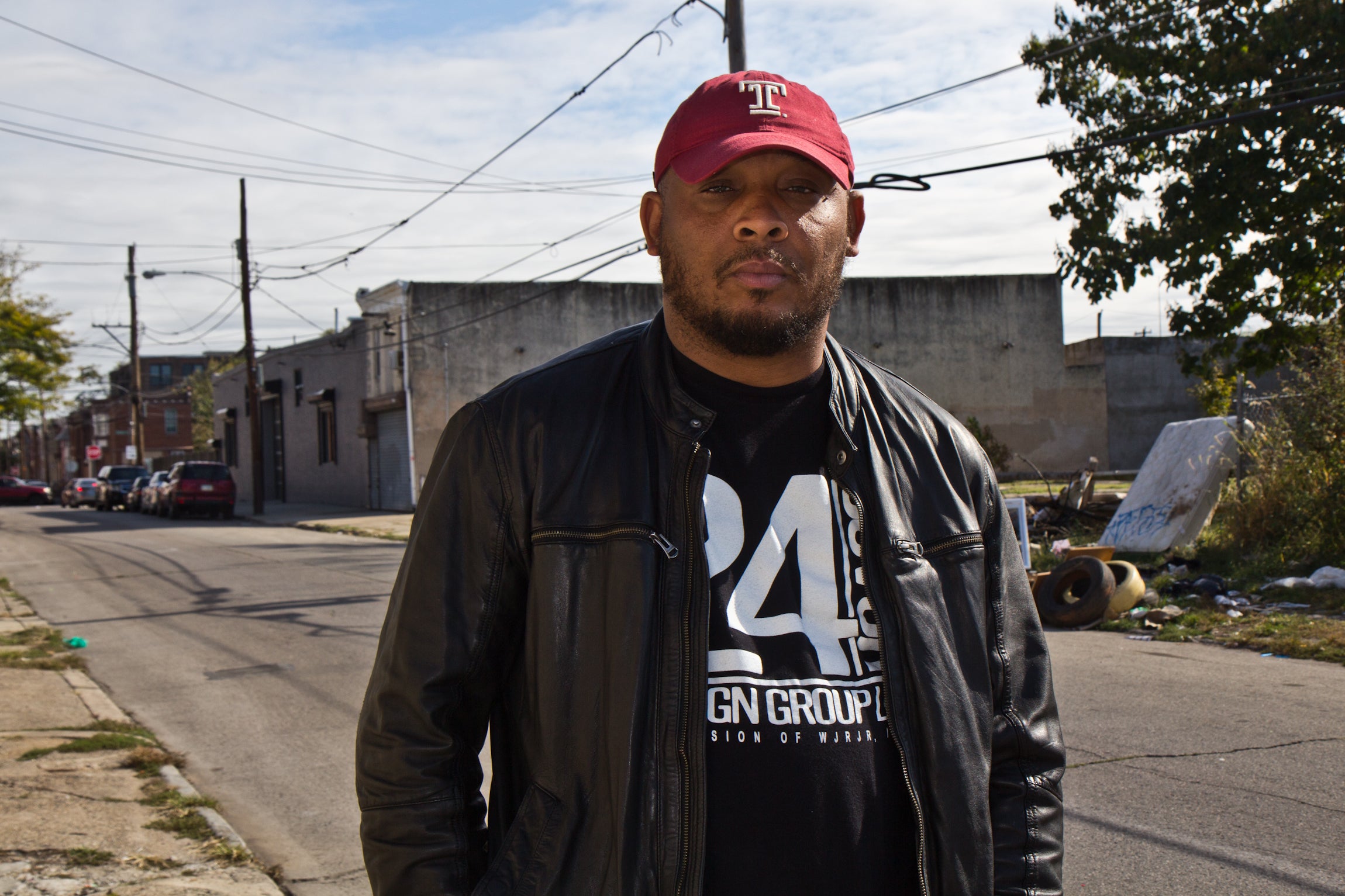
Evaluation of leaf-blower pilot to come
How that determination could be made remains an open question for workers like Armstead and Santana. The current phase of the city’s leaf-blower pilot program ends Dec. 1. The two workers aren’t optimistic that the safety equipment they want will come before that end date.
Drexel University professor Peter DeCarlo said those extra weeks of exposure could have an impact on workers’ health.
In addition to the risk of disease, workers using leaf blowers to push trash around could experience respiratory complications if they continue to breathe in hazardous emissions without proper protection.
DeCarlo said the emissions – “all the bad stuff in the gasoline we don’t like to breathe” – are more concentrated than what comes out of a car’s tailpipe.
Other hazards can show up in the debris on city streets, which typically contains brake and tire wear, which can contain heavy metals like lead, according to the environmental engineering professor.
“Not using any kind of personal protective equipment right now seems to go against all that we’ve learned over the many years that people have been looking at dust and exposure to other things. And so it strikes me as silly that no one is requiring for this to be done at this point,” said DeCarlo.
It’s unclear if city workers will use leaf blowers to clean up city streets past December.
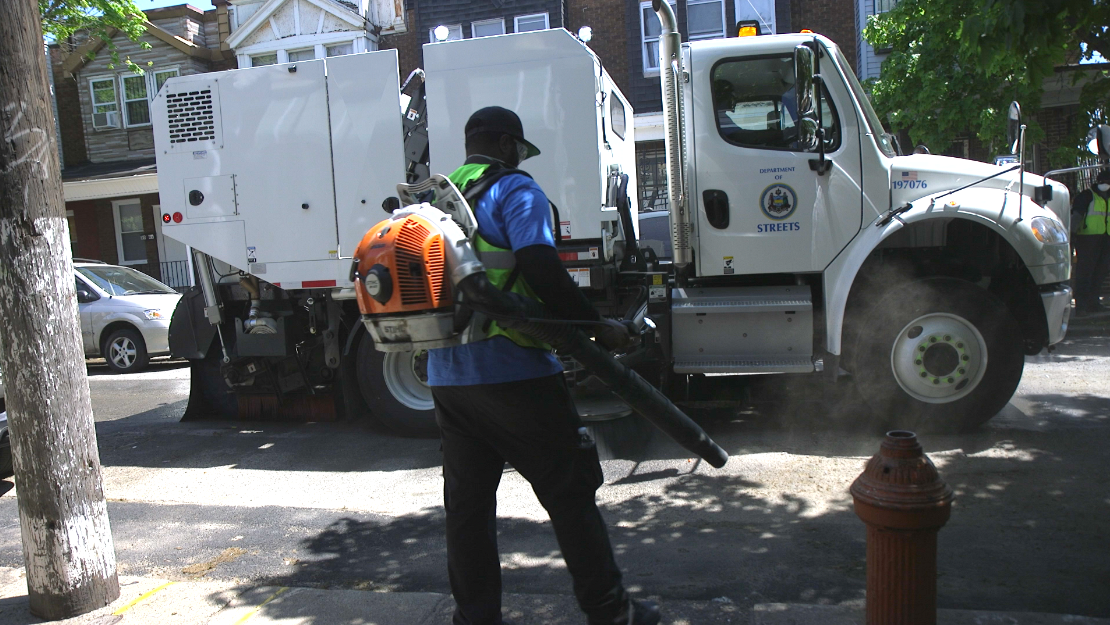
The Streets Department launched the program to test whether the hand-held blowers could be used to clean streets without requiring residents to move their cars, something people have griped about for years.
The pilot has hit a few snags. Crews have struggled to keep pace with the program’s weekly schedule. Less than two months into the pilot, the city realized it spent millions on trucks that couldn’t squeeze down some streets.
The news followed a WHYY investigation that found that crews part of a pre-existing street sweeping program rarely show up.
The city will evaluate the street sweeping pilot after it wraps, but Williams says he’s encouraged by what he’s seen so far, and that concerns about worker safety will not spike the possibility of using leaf blowers in the future. The department, he said, would simply resolve them before the next phase of the program, scheduled to start next April.
“We want to make sure they have the appropriate gear,” said Williams.
WHYY is your source for fact-based, in-depth journalism and information. As a nonprofit organization, we rely on financial support from readers like you. Please give today.





